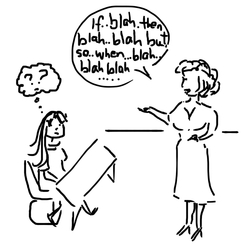
Hearing, listening, understanding what we hear and remembering what we hear is such an amazing process.
From hearing sounds to following complex instructions, there are many links in this chain.
When a child is not able to learn well from listening, they can miss the majority of teaching in a typical classroom.
One possible reason for this can be "Auditory Processing Disorder".
From hearing sounds to following complex instructions, there are many links in this chain.
When a child is not able to learn well from listening, they can miss the majority of teaching in a typical classroom.
One possible reason for this can be "Auditory Processing Disorder".
I was recently on a webchat about "Auditory Processing Disorders (APD)", with some experts from the American Speech and Hearing Association.
The label 'APD' is hotly debated in the research and amongst the allied health and medical practitioners who support children with learning disabilities. Many symptoms of APD overlap with disorders of language processing, sensory processing, behavioural and attention disorders, so a process of elimination is required for accurate diagnosis and effective treatment
The label 'APD' is hotly debated in the research and amongst the allied health and medical practitioners who support children with learning disabilities. Many symptoms of APD overlap with disorders of language processing, sensory processing, behavioural and attention disorders, so a process of elimination is required for accurate diagnosis and effective treatment
Signs of APD:
- not remembering what was said to you
- responding inappropriately to questions and instructions
- difficulty hearing or concentrating in background noise
What to do: Assessment
- Audiology assessment
- a functional hearing test checks the ear function to make sure hearing is normal
- an auditory processing test checks whether the brain is registering what the ear is hearing
- a language assessment checks whether the sounds and meaning of the message is understood and whether the child can remember and use the information
- a cognitive assessment checks whether the child is able to pay attention to the message and compares different processes used for learning
What to do: Strategies
ALL children learn better in a quiet classroom so...
ALL children learn best from doing, so for less talk more action...
What to do: Therapies
ALL children learn better in a quiet classroom so...
- use soft furnishings and sound insulation to absorb background noise
- fix background clicking, whirring, buzzing noises from lights, fans, air conditioners, computers
- be clear about group work time vs. quiet time for independant tasks
- create a quiet corner where a student can concentrate more easily on individual work
- personal amplification systems help children with APD tune into the teacher's voice_
ALL children learn best from doing, so for less talk more action...
- keep instructions short and simple
- speak slowly
- give only one instruction at a time
- make eye contact when you give an instruction
- reduce background chatter before you give an instruction
What to do: Therapies
- listening can be improved with an audiologist, using fun new computer-based programs targeting skills such as sound localisation, pitch and tone patterns, auditory attention, closure and timing
- understanding can be improved with speech therapy targeting language skills such as phonological awareness, vocabulary and grammar
 RSS Feed
RSS Feed